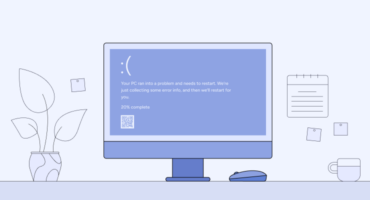VPNs against Viruses & Malware: Yes or No?
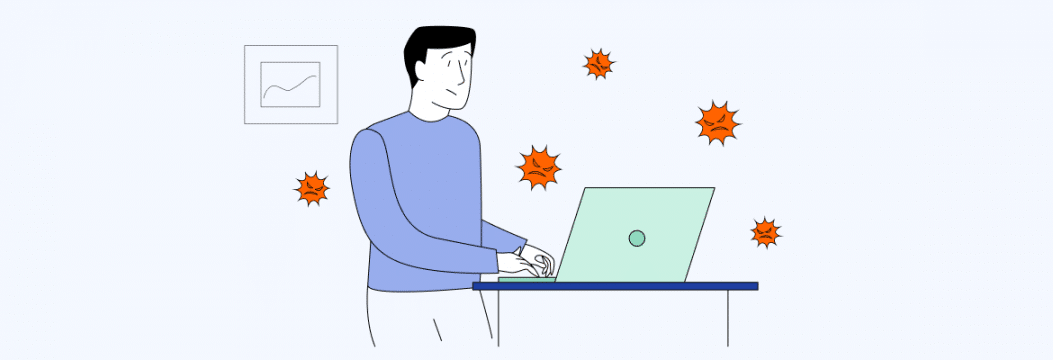
Malware…viruses…you must have heard of them at some point. But we’re sure those weren’t good things — malware is infamous for stealing and deleting data, spying on you, damaging your hardware, and much more. So, it’s something you’d obviously want to avoid.
A powerful cybersecurity tool, a VPN, could have crossed your mind in this regard. But is it effective against viruses and malware, in general? In this article we’ll list what is and isn’t on the VPN’s job description list. Let’s get started.
How to know if your device is virus-infected
Note: Although often used interchangeably, malware and viruses are technically different. While malware is a term for any kind of malicious software, a virus is a specific type of malware that replicates itself into other programs.
First things first, how do you know if your device is virus-infected? Well, it might have a virus if you notice the following:
- Unusually slow speeds and performance
- Frequent device crashes
- Unfamiliar programs that start when you turn on the device
- Mass emails being sent from your account
- Changes to your device’s personalized features and passwords
Are VPNs safe?
Before turning to a VPN, many wonder if this solution is safe. Without further ado — yes, using a VPN is safe, but only if you use a trustworthy provider. We know that many free VPNs are out there. Yet, however appealing the lack of a price tag might be, one can’t guarantee their safety and reliability. In this case, you won’t pay in money, but in limited functionality and a risk of your data being exposed or sold.
A reliable VPN is a great cybersecurity tool. Similar to how you can leave behind footprints when walking, you also leave digital traces when using the internet. And a VPN helps you erase those traces (personal information, records of your online activities, and so on) to protect your privacy online. But what else can a VPN do? Is being an antivirus on the agenda? Let’s move along to find out.
Can a VPN protect you from a virus?
No — preventing you from getting viruses isn’t on the VPN’s job description. While effective at protecting your privacy, it doesn’t keep viruses at bay on its own. Spoiler alert — a VPN can protect you from malware of some sort, though, but more on that in a bit.
VPN protection: What’s included?
Although a VPN doesn’t protect you against viruses directly, it’s useful in guarding you against other not less alarming things. What are they? We’ve compiled a list for you.
Public hotspot snoopers
Connecting to a public Wi-Fi hotspot often seems like a lifesaver. However, be warned that these networks can do you more harm than good, being known for unencrypted connections and high exposure to cyberattacks. Another thing public hotspots are notorious for is snoopers or hackers who can see everything you’re up to while connected. Fortunately, using a VPN as you connect to the hotspot gives a layer of encryption between your activity and the outside world, leaving hackers to prey on someone else.
Ad and malware blocking
560,000 new pieces of malware are detected every day. And they’re often carried via relentless ads on the web. Luckily, many advanced VPNs usually have a built-in ad and malware blocker. So, although a VPN doesn’t prevent viruses directly, it does protect against malware attacks, in a way. These blockers can identify and block sites hosting malware, so it never reaches your device to start with.
ISP snooping
Using a reliable VPN is the best for hiding web activity from your Internet Service Provider (ISP). In addition to encrypting all the information about you, a VPN also transfers your IP address to the VPN’s server. It means that your ISP can’t decipher the contents of your internet traffic nor can it figure out where your traffic is traveling to. That means your ISP only sees encrypted data traveling to a server but can’t see exactly what sites you visit or anything you do.
ISP throttling
Similarly, you can bypass ISP throttling (when an ISP deliberately limits your internet’s bandwidth) with a VPN as it will hide the content you’re viewing from your ISP. It’s plain as a day here — since a VPN blocks your ISP from seeing your web activity, the latter can’t throttle any.
Tracking prevention
Apart from ISPs, other third parties, like website owners, ad agencies, search engines, can track your data, too. Yet, VPNs masking your IP address and location means you won’t be targeted. And since the connection itself is encrypted, no snoopers can intercept your communication.
VPN protection: What’s NOT included?
At the same time, a VPN isn’t almighty. Here’s what it won’t protect you against.
A compromised website
Site admins may not follow the best practices to secure your data. And if the website doesn’t store your information correctly, it could be stolen or misused. So you have to be careful which sites you give your info to, as a VPN can’t protect you if that site’s compromised.
Data you willingly gave away
If you purposefully give away your data, for example, to Facebook or Google, you give your consent. So if you share some personal info and it gets intercepted by a third party, there’s nothing a VPN can do.
Malware site prevention
As we’ve mentioned before, some VPNs provide a real gem in the form of an ad/malware blocker that alerts you before you access a dangerous site. But some don’t. So if it’s an essential feature for you, you should check out whether your provider offers it.
Infected torrents
This one comes down to your self-judgment. You can get a warning that a site hosting torrent links, like The Pirate Bay, is dangerous, and while many files are infection-free, others may be bundled with malware. If a file does contain a virus, a VPN won’t help you out.
Social engineering attempts
Infamous today are social engineering attacks that largely play on user trust. Among them are phishing sites typically designed to look identical to the legit one. Besides, they’re now a more prevalent type of fraudulent activity than malware sites, outnumbering them 8 to 1. An example of one commonly mimicked site is PayPal since getting access to user credentials is surely profitable for hackers. And if you trust the scammer, they’ll get past security features of your VPN.
To sum it up a bit and answer our main question — VPN against viruses — no, but a VPN against (other types of) malware — Yes!
Cyberhygiene: How to protect yourself from viruses?
Last but not least, you shouldn’t let it all go with the flow. That’s why, let’s outline some ways to help maintain your device virus-free.
1. Keep your OS and apps updated
You need to check new updates for operating systems and apps as they provide new features, solve security-related problems and improve privacy.
2. Avoid pirated material
Apart from being illegal, such files might often contain viruses and other types of malware that can infect your device. So it’s better to steer clear of them.
3. Be careful of phishing scams with sites and emails
Phishing attacks are everywhere on the web today — it doesn’t take long to create legit-looking yet malicious websites. And to avoid such scams, you should always check the web address in the URL address bar (pay higher attention to those sites that can store your personal information, like PayPal). You can also check the certification status of the website and see if there’s a lock symbol next to the URL, like here:

No lock symbol indicates the website doesn’t have an HTTPS (or SSL) certificate. And today, most trustworthy websites and businesses have it.
4. Install an antivirus that works well with a VPN
Again — a VPN is not an antivirus, but a privacy tool. But it doesn’t mean there isn’t a degree of overlap that will make it beneficial to use both tools together. For instance, an antivirus identifies malicious code on your device and removes it, while some VPNs can detect and block sites that host malware, so it would never reach your device. This way, you’ll kill two birds with one stone — keep your devices safe and protect your privacy online.
A good thing is that you don’t have to look for a reliable VPN long — VeePN has got your back. It’s one of the few providers offering a top ad and malware blocker — NetGuard.
NetGuard makes your online experience faster and more secure by blocking ads, trackers, and malicious websites. It reacts immediately and blocks your access if you visit a suspicious website that may be hosting malware, spyware or other malicious software. With it, you can also stay away from botnet control and omit pop-up ads. The feature is present on Windows, macOS, iOS, and Extension (OpenVPN only), and you can enable it in settings. On iOS, it looks like this:
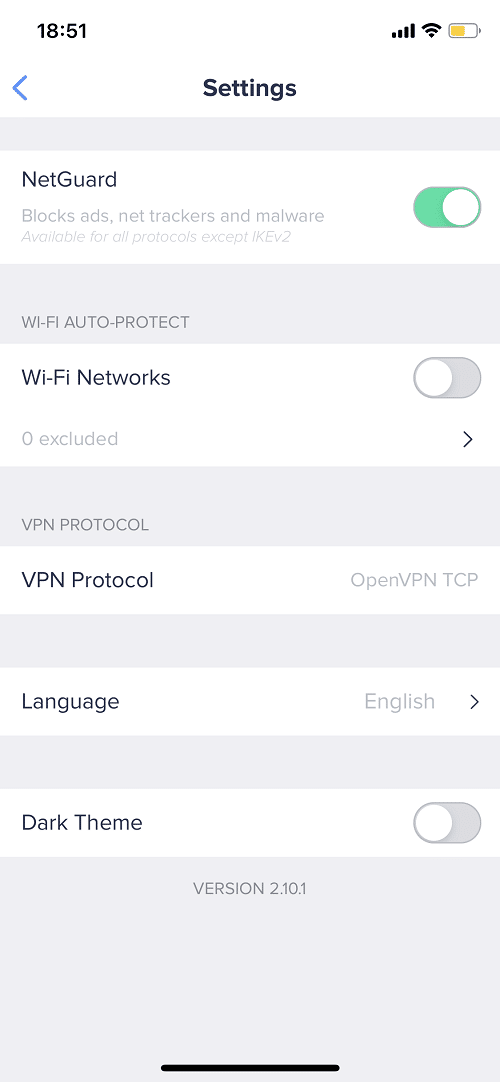
The VPN Windows and macOS apps, as well as Extension, don’t have the NetGuard feature as such but three different switches, which perform the same role. For example, here is how it looks on:
- Windows:
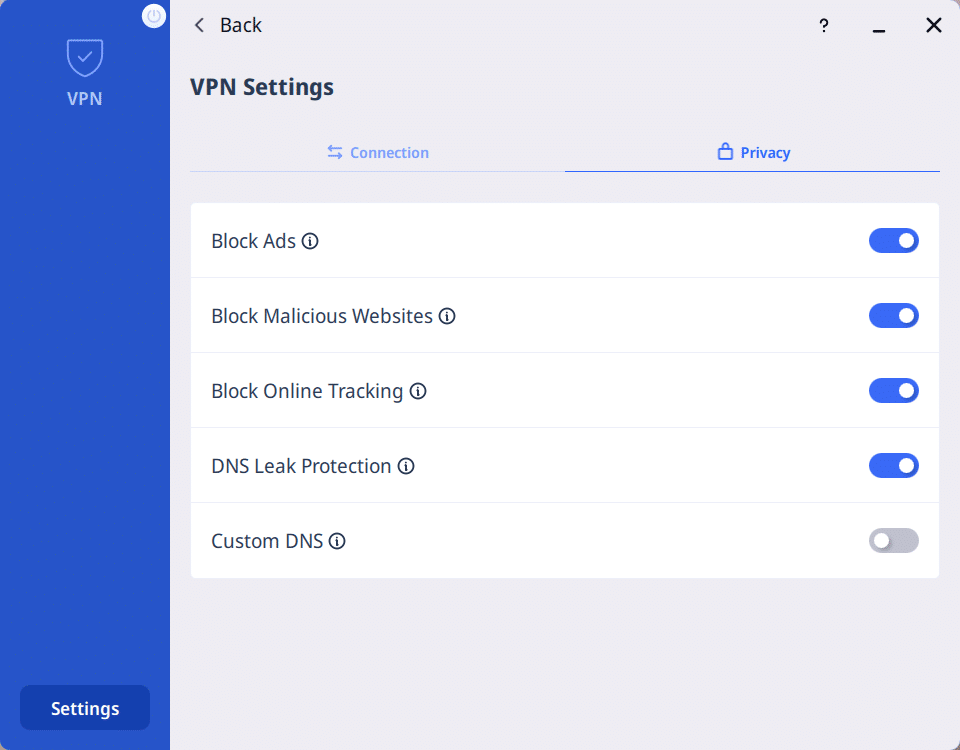
2. Mac:
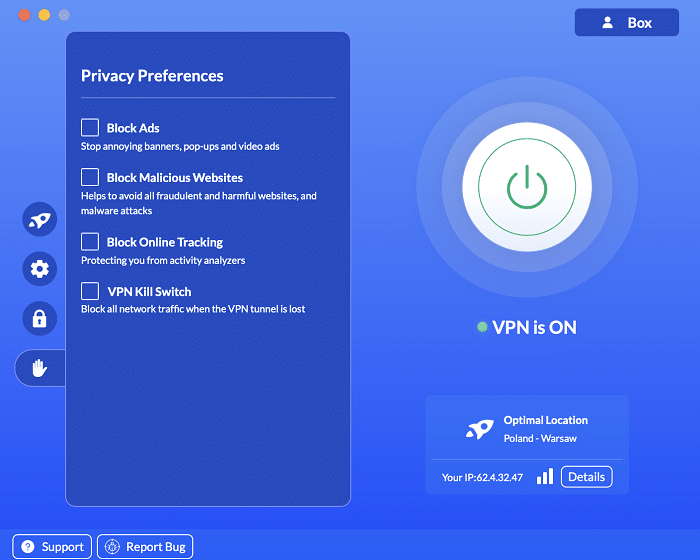
3. On the Chrome extension:
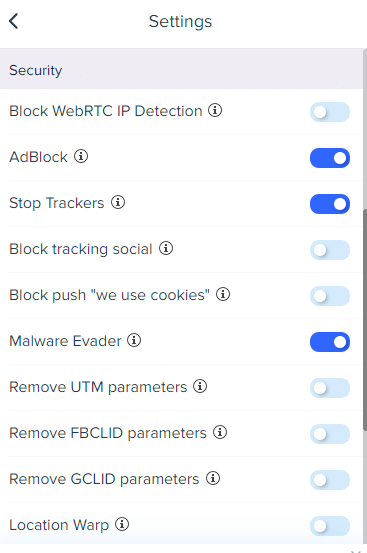
You can see on the screenshots that VeePN prevents tracking as well, with the iOS app having this feature embedded in NetGuard, while Windows, macOS, and browser extensions have a separate switch for it. Another goodie is VPN Kill Switch — a feature that automatically blocks network access in case your VPN connection drops out. Connection drops do happen sometimes, so it’s better to be prepared for this scenario.
That said, why don’t you give VeePN a shot? Try it out and make the Internet a safe place for you.
FAQ
Do you still need antivirus with a VPN?
Yes, if you want to enhance your online security. An antivirus protects your device against software threats, while a VPN encrypts your data, keeps it safe, and hides your web activity from prying eyes.
Can a VPN stop a virus?
No, you’d need an antivirus software for that since preventing viruses isn’t on the agenda for a VPN.
How does a VPN protect your confidentiality?
A VPN conceals your online identity and guarantees anonymity by hiding your IP address and encrypting your data, which prevents third parties like your ISP, ad agencies, hackers, and others, from snooping on you. Choose a reliable VPN like VeePN that shields your personal data and safeguards your identity.
VeePN is freedom



